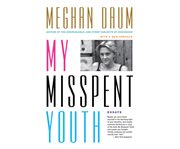Review by Booklist Review
Daum's (The Unspeakable, 2015) latest essay collection chronicles the dramatic culture shift between mid-2016, when she intended to write a book about Hilary Clinton, and the current political moment. Using a blend of memoir and editorial comment, Daum discusses the evolution of feminism from the movement she knew as a young Gen X-er to the style of feminism she sees represented on social media today. In eight chapters, she opines on many high profile topics from the past three years, including the #MeToo movement, Christine Blasey Ford's Senate testimony, and infighting in the modern left. An overarching theme is Daum's attempt to grapple with toughness, aging, and her own bewilderment with younger generations. Many of her critiques touch on the surface of ideas without diving fully into them, relying on anecdotes to further her points. While Daum introduces some compelling ideas, such as the watering down of intellectual language to meet the speed of the digital world, some readers may wish for an overall more thorough examination of her arguments' foundations.--Laura Chanoux Copyright 2010 Booklist
From Booklist, Copyright (c) American Library Association. Used with permission.
Review by Publisher's Weekly Review
As a self-identified liberal with a "penchant for devil's advocacy," essayist Daum (The Unspeakable) explores hypocrisy and lack of nuance from the Left in this edgy polemic. She takes aim at the undeveloped, hamfisted modes of expression on social media; recalls arguing with friends who believe "the world sucks for women"; dismisses the concept of toxic masculinity because some women also engage in toxic behavior; argues that the Title IX regulation meant to protect sexual assault victims on college campuses fails to account sufficiently for false accusations; and recounts becoming fascinated with "free speech" personalities such as Christina Hoff Sommers and Jordan Peterson. She is most nuanced and perceptive when looking at the personal; for example, she draws an astute connection between this growing interest and the end of her marriage, and acknowledges that her opinions are informed by "aging and feeling obsolete." But the book is largely more cultural in focus. In one characteristic moment, she asks, "Are we only allowed to punch up? And if so, does that mean those of us perceived to be on the highest rungs are left just waving our fists in the air, with nothing to punch? Maybe. But I still feel like punching something a lot of the time." Fans of Daum's searching, incisive essays and memoirs will likely be put off; fans of her opinion columns and fellow contrarians may be more receptive. (Oct.)
(c) Copyright PWxyz, LLC. All rights reserved
Review by Kirkus Book Review
A sweeping critique of the "wokescenti."Award-winning essayist, memoirist, and novelist Daum (The Unspeakable: And Other Subjects of Discussion, 2014, etc.), recipient of Guggenheim and National Endowment for the Arts fellowships, takes on fourth-wave feminism, victimhood, identity politics, #MeToo, social media, ideological warfare on college campuses, and assorted other irritants in a culture that is "effectively mentally ill." Social media, asserts the author, creates an echo chamber where people lie to one another and eagerly wait for friends to lie back. "I am convinced," she writes, "the culture is effectively being held hostage by its own hyperbole. So enthralled with our outrage at the extremes, we've forgotten that most of the world exists in the mostly unobjectionable middle." Examining displays of outrage as public performance, she writes that "the search for grievance has become a kind of political obligation, an activist gesture." Accusations of sexism, sexual harassment, or assault, she believes, foster women's image of themselves as victims rather than individuals "capable of making mistakes"; in making such accusations, women "literally hand men their own power." Rather than see the gender wage gap as evidence of sexism, Daum suggests "that there are biological differences between male and female brains that can influence women's professional decisions." She also criticizes "the left-leaning chatterati" who praised Ta-Nehisi Coates' Between the World and Me as engaging in "self-congratulatory reverence," wondering "if my white friends and colleagues who venerated Coates actually liked his work or just liked the idea of liking it." This suspicion of other people's authenticity underlies much of the book: Daum admits that when she was an undergraduate in the midst of student uprisings, she "often felt like I was impersonating a college studentI had a hard time believing other people were actually for real." Now middle-aged, divorced, childless by choice, and feeling increasingly marginal, the author is dismayed by those whose energetic engagement with social and cultural problems fuels "the exquisite lie of our own relevance."Sharp, brazen, and undeniably controversial. Copyright Kirkus Reviews, used with permission.
Copyright (c) Kirkus Reviews, used with permission.

